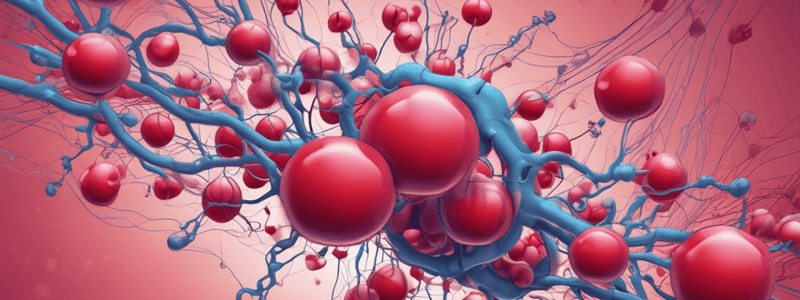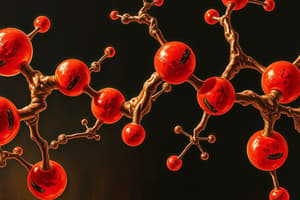Podcast
Questions and Answers
What is the quaternary structure of hemoglobin in adults?
What is the quaternary structure of hemoglobin in adults?
What is the main difference between the structure of myoglobin and hemoglobin?
What is the main difference between the structure of myoglobin and hemoglobin?
What is the function of the hydrophobic pocket in globins?
What is the function of the hydrophobic pocket in globins?
What is the orientation of the hydrophilic side of the haem group in globins?
What is the orientation of the hydrophilic side of the haem group in globins?
Signup and view all the answers
What is the length of the globin proteins?
What is the length of the globin proteins?
Signup and view all the answers
What is the secondary structure of the globin proteins?
What is the secondary structure of the globin proteins?
Signup and view all the answers
What is the primary mechanism by which carbon dioxide is transported in the blood?
What is the primary mechanism by which carbon dioxide is transported in the blood?
Signup and view all the answers
What percentage of carbon dioxide is dissolved in blood plasma?
What percentage of carbon dioxide is dissolved in blood plasma?
Signup and view all the answers
What is the effect of an increase in [H+] on the binding of oxygen to haemoglobin?
What is the effect of an increase in [H+] on the binding of oxygen to haemoglobin?
Signup and view all the answers
At what pH is the 50% Hb saturation at pO2 ~27 mm Hg?
At what pH is the 50% Hb saturation at pO2 ~27 mm Hg?
Signup and view all the answers
What is the primary function of carbonic anhydrase in erythrocytes?
What is the primary function of carbonic anhydrase in erythrocytes?
Signup and view all the answers
What is the physiological importance of the Bohr effect?
What is the physiological importance of the Bohr effect?
Signup and view all the answers
What is the result of an increase in [H+] in peripheral tissues?
What is the result of an increase in [H+] in peripheral tissues?
Signup and view all the answers
What is the percentage of carbon dioxide that is transported bound to haemoglobin?
What is the percentage of carbon dioxide that is transported bound to haemoglobin?
Signup and view all the answers
Why is haemoglobin monitored in type 1 diabetes?
Why is haemoglobin monitored in type 1 diabetes?
Signup and view all the answers
What is the consequence of non-enzymatic glycosylation of plasma proteins?
What is the consequence of non-enzymatic glycosylation of plasma proteins?
Signup and view all the answers
What is the half-life of haemoglobin?
What is the half-life of haemoglobin?
Signup and view all the answers
What is the substitution in sickle cell anaemia?
What is the substitution in sickle cell anaemia?
Signup and view all the answers
What is the effect of the substitution in sickle cell anaemia?
What is the effect of the substitution in sickle cell anaemia?
Signup and view all the answers
What is the term for individuals with one copy of the mutant gene?
What is the term for individuals with one copy of the mutant gene?
Signup and view all the answers
What is the term for individuals with two copies of the mutant gene?
What is the term for individuals with two copies of the mutant gene?
Signup and view all the answers
What is the shape of the cells in sickle cell anaemia?
What is the shape of the cells in sickle cell anaemia?
Signup and view all the answers
What is the result of a reduced level of carbon dioxide in the blood?
What is the result of a reduced level of carbon dioxide in the blood?
Signup and view all the answers
Which type of hemoglobin has a higher affinity for oxygen?
Which type of hemoglobin has a higher affinity for oxygen?
Signup and view all the answers
What is the function of 2,3-bisphosphoglycerate (BPG) in oxygen binding of hemoglobin?
What is the function of 2,3-bisphosphoglycerate (BPG) in oxygen binding of hemoglobin?
Signup and view all the answers
What is the ratio of HbA to HbF at birth?
What is the ratio of HbA to HbF at birth?
Signup and view all the answers
What is the effect of the Bohr effect on oxygen release to tissues in the periphery?
What is the effect of the Bohr effect on oxygen release to tissues in the periphery?
Signup and view all the answers
Which type of hemoglobin is saturated in preference to HbA in the placenta?
Which type of hemoglobin is saturated in preference to HbA in the placenta?
Signup and view all the answers
What is the pO2 at which 50% of HbA is saturated?
What is the pO2 at which 50% of HbA is saturated?
Signup and view all the answers
What is the effect of BPG binding on HbF?
What is the effect of BPG binding on HbF?
Signup and view all the answers
What is the main consequence of the conformation change in deoxyHbS?
What is the main consequence of the conformation change in deoxyHbS?
Signup and view all the answers
What is the role of hydrogen bonds in sickle cell disease?
What is the role of hydrogen bonds in sickle cell disease?
Signup and view all the answers
What is the result of polymers of HbS forming in the erythrocyte?
What is the result of polymers of HbS forming in the erythrocyte?
Signup and view all the answers
What is the consequence of low Fe2+ intake in the diet?
What is the consequence of low Fe2+ intake in the diet?
Signup and view all the answers
What is the characteristic of α-thalassaemia?
What is the characteristic of α-thalassaemia?
Signup and view all the answers
What is the characteristic of HbH?
What is the characteristic of HbH?
Signup and view all the answers
Study Notes
Structure of Hemoglobin and Myoglobin
- Hemoglobin (Hb) is a tetramer composed of 2 identical beta globin subunits and 2 identical alpha globin subunits
- Hb is a dimer of a dimer (α1β1)(α2β2)
- In adults, Hb is HbA
- Myoglobin (Mb) is a monomer
- Both Mb and Hb have similar structures with alpha helices and a haem group buried within a hydrophobic pocket
Transportation of Carbon Dioxide in Blood
- Carbon dioxide is transported in the blood through three mechanisms:
- Dissolved in blood plasma (10%)
- Converted to bicarbonate (60%)
- Bound to Hb (30%)
Bohr Effect
- The ability of hemoglobin to bind oxygen decreases as the [H+] increases or as the pH decreases
- This effect is physiologically important in peripheral tissues, where oxygen is released from hemoglobin in response to increased carbon dioxide levels
Fetal Hemoglobin
- During development, different hemoglobins are expressed, including embryonic hemoglobins and fetal hemoglobin (HbF)
- HbF has a higher affinity for oxygen than HbA
- At birth, 20% of hemoglobin is HbA and 80% is HbF
2, 3-Bisphosphoglycerate (BPG) and Oxygen Binding
- BPG is an allosteric regulator of oxygen binding of hemoglobin
- BPG binds to the internal position of Hb but only in the T-state (deoxyHb)
- BPG lowers the affinity of Hb for oxygen
- HbF has a variation in sequence that reduces BPG binding, increasing the difference in affinities between HbF and HbA
Type 1 Diabetes and Hemoglobin
- Diabetes results in elevated plasma glucose levels, which can cause non-enzymatic glycosylation of plasma proteins
- Hemoglobin is not degraded after synthesis and has a half-life of 120 days
- The level of glycosylated Hb (HbA1c) is used to monitor glucose levels over a three-month period
Sickle Cell Anemia
- Sickle cell anemia is a recessively inherited anemia characterized by the formation of sickle-shaped cells
- The disease is caused by an inherited mutation of β-globin, resulting in a substitution of glutamic acid with valine at position 6
- This substitution creates hydrophobic "sticky" patches on the surface of the β-globin
- The sickle cell trait is characterized by one copy of the mutant gene, while sickle cell disease is characterized by two copies of the mutant gene
HbS Aggregation
- Conformation change in deoxyHb results in the alpha helix containing position 6 shifting to the surface
- In HbA, glutamic acid is stabilized by hydrogen bonds with the aqueous environment
- In HbS, the valine is not in an aqueous environment, leading to aggregation of two hemoglobins
- This aggregation continues to form polymers
Formation of Sickle-Shaped Cells
- Polymers of HbS disrupt the erythrocyte membrane and prevent deformability, resulting in sickle-shaped cells
- Sickle-shaped cells can be trapped in capillaries and lyse
Hemoglobin and Other Diseases
- Low Fe2+ intake in diet may lead to anemia
- Hereditary hemolytic anemia can be caused by an imbalance of globin chain production
- α-thalassaemia is characterized by deficient α-globin production, while β-thalassaemia is characterized by deficient β-globin production
- Hereditary persistence of fetal hemoglobin (HPFH) is a condition where HbF is produced throughout adulthood
Studying That Suits You
Use AI to generate personalized quizzes and flashcards to suit your learning preferences.
Description
This quiz covers the structure of hemoglobin (Hb) and myoglobin (Mb), including their subunits and biochemical composition.




